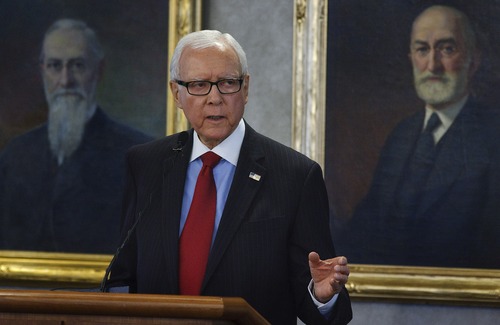This is an archived article that was published on sltrib.com in 2014, and information in the article may be outdated. It is provided only for personal research purposes and may not be reprinted.
Washington • Sen. Orrin Hatch is among three Republicans releasing a new plan to replace Obamacare with their own system of tax credits to help the uninsured gain coverage.
The proposal, pushed by Hatch, R-Utah, and Sens. Richard Burr, R-N.C., and Tom Coburn, R-Okla., comes four years after the Affordable Care Act became law, but during the first big open enrollment period for new insurance marketplaces.
In this congressional election year, Republicans hope to score with voters by continuing to hammer at the Affordable Care Act, which remains unpopular in public-opinion polls. At the same time, Republicans have been stung by Democratic criticism that they have no solid counterproposal.
They now have one.
The senators say this plan, which they know has no shot at becoming law while President Barack Obama remains in office, is a less-intrusive way to expand coverage and lower premiums. Obama's term ends in January 2017, though Republicans hope to win the Senate from Democrats in November and maintain their majority in the House.
"After first repealing the president's health law, we take aim at the chief concerns of the American people — greater economic security by driving down costs and expanding access to high-quality care through increased insurance market competition and reforms," Hatch said in a statement. "What we've put forward is sustainable and achievable — and without the tax hike, mandates, and budget-busting spending that have made Obamacare so unpopular with the American people."
The senators are dubbing their proposal the Patient CARE Act, though they are not yet ready to introduce a bill. The eventual legislation would repeal all of the Affordable Care Act, except for parts related to Medicare, which would be handled by a separate bill.
Senate Majority Leader Harry Reid's office did not respond to a request for comment on the Republican plan.
The GOP proposal includes some of the popular areas of Obama's signature health law, such as allowing young people to stay on their parents' insurance up to age 26 and eliminating lifetime benefit caps. But it would remove the requirement that people buy insurance or pay a fine or that employers of a certain size must offer insurance or face a financial penalty. Republicans claim those mandates hurt businesses and consumers and destabilize the market. It would also do away with a blanket guarantee that insurers can't deny coverage to people who have a preexisting condition.
Instead, the Republicans would create a "continuous coverage" rule. If people decided to switch individual plans or lost their jobs, they couldn't be denied as long as they sought coverage in a timely fashion. If they waited, insurers may be able to reject them. There would also be a six-month open-enrollment period each year.
Anyone making less than 300 percent of the poverty level ($34,470 in 2013) would be eligible for a refundable tax credit to buy insurance and the government would not set minimum coverage standards as they do under the Affordable Care Act.
These three senators would also roll back the expansion of Medicaid, which under the Affordable Care Act can cover anyone under 133 percent of the federal poverty level if a state opts in.
Utah has yet to do so, though Gov. Gary Herbert said the state will expand Medicaid in some fashion in the coming weeks.
Hatch's plan would allow people to opt out of Medicaid and get a tax credit to buy insurance on the open market if they desire.
To pay for this plan, the senators propose a new tax on a portion of employee-provided health coverage. As it currently stands, health plans offered through a big employer are paid with pretax dollars. This plan would say that the first 65 percent of an average plan's cost would be pretax, but the remainder would be taxed.
The GOP senators said this is a fair policy since insurance bought on the individual mandate is not pretax.
Like many Republican plans, this proposal would make it harder to sue for medical malpractice and would expand the tax benefits of health-savings accounts.
Twitter: @mattcanham



